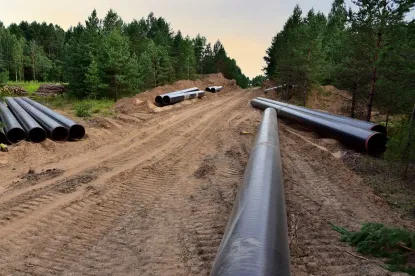Whether you are a James Beard Award-winning chef or a self-taught home cook dreaming of that shiny new gas stove, you can rest somewhat easier. The U.S. Court of Appeals for the Ninth Circuit has ruled that the federal Energy Policy and Conservation Act (ECPA), 42 U.S.C. § 6297(c) preempts the City of Berkeley, California’s 2019 regulation prohibiting the installation of natural gas piping in new buildings.
On April 17, 2023, the court of appeals issued an opinion in California Restaurant Association v. City of Berkeley, No. 21-16278, reversing a lower court decision and finding that ECPA “expressly preempts state and local regulations concerning the energy use of many natural gas appliances, including those used in household and restaurant kitchens.” Berkeley’s ordinance, similar to those proposed elsewhere, did not ban gas appliances.
Instead, the city prohibited installation of natural gas piping extending from the local distribution company’s facilities into new buildings, making the use of gas appliances in such buildings impossible. Prohibition of Natural Gas Infrastructure in New Buildings, Berkeley Mun. Code § 12.80.040(A). The stated purpose of the ordinance was to “eliminate obsolete natural gas infrastructure and associated greenhouse gas emission in new buildings where all-electric infrastructure can be most practicably integrated, thereby reducing the environmental and health hazards produced by the consumption and transportation of natural gas.” Id. at § 12.80.010(H).
The district court below rejected the preemption argument, narrowly construing ECPA as applying only to consumer products that are not regulated under the ordinance and limiting its “sweep into areas that are historically the province of state and local regulation.” California Restaurant Association v. City of Berkeley, 547 F. Supp. 3d 878, 891 (N.D. Cal. 2021). The appeals court’s opinion examines the text, structure, and context of the ECPA to evaluate the preemption argument and reaches the opposite result.
The court explains that once the federal government establishes an energy conservation standard for a particular product, ECPA provides that “no State regulation concerning the energy efficiency, energy use, or water use of such covered product shall be effective with respect to such product.” 42 U.S.C. § 6297(c) (emphasis added).
Section 6291(4) defines “energy use” as “the quantity of energy [including electricity or fossil fuels] directly consumed by a consumer product [including kitchen ovens] at point of use.” This leads the court to conclude that “by its plain language, ECPA preempts Berkeley’s regulation here because it prohibits the installation of necessary natural gas infrastructure on premises where covered natural gas appliances are used.” Slip op. at 13. The court further rejects Berkeley’s argument that the total prohibition on natural gas piping in the ordinance does not regulate “energy use” because “zero” cannot serve as the “quantity of energy” in “energy use.” Id. at 14.
The court finds that an ordinance that effectively eliminated the “use” of an energy source is not exempt from ECPA, and concluded that “by enacting ECPA, Congress ensured that States and localities could not prevent consumers from using covered products in their homes, kitchens, and businesses. ECPA preemption extends to regulations that address the products themselves and the onsite infrastructure for their use of natural gas.” Id. at 15 (emphasis in original).
ECPA preemption is not limited to products, but also applies to any regulation that “concerns” such products. Id. at 15-16 citing § 6297(c). Moreover, the court recognizes that ECPA contains an entire subsection (§ 6297(f)) on building code requirements, showing that Congress intended for ECPA to preempt building codes that serve as energy use regulations.
Next, the court notes that the government can waive preemption of ECPA only if state regulation does not “significantly burden manufacturing, marketing, distribution, sale, or servicing of the covered product on a national basis.” § 6297(d)(3). Accordingly, the court concludes that “no doubt, Berkeley’s ban, if adopted by States and localities throughout the country, would ‘significantly burden’ the ‘sale’ of covered products ‘on a national basis.’”
The court also is unconvinced by the federal government’s amicus brief arguing that ECPA only preempts conservation standards and by Berkeley’s suggestion that finding preemption would “impliedly repeal” the Natural Gas Act.
Finally, the court declines to limit the reach of the statute, finding that:
States and localities can’t skirt the text of broad preemption provisions by doing indirectly what Congress says they can’t do directly. ECPA would no doubt preempt an ordinance that directly prohibits the use of covered natural agas appliance in new buildings. So Berkeley can’t evade preemption by merely moving up one step in the energy chain and banning natural gas piping within those buildings. Otherwise, the ability to use covered products would be “meaningless” if consumers can’t access the natural gas available to them within the City of Berkeley. Id. at 23 (emphasis in original).
The Berkeley ordinance is unlikely to be the last attempt by a local government or state to restrict or prohibit the use of natural gas for cooking and heating in homes and businesses, directly or indirectly. As many as 20 states and large cities, including, Boston, New York City, and San Francisco, have passed bans on new natural gas heating and appliances or their installation in new buildings. Berkeley has announced its intent to appeal the decision to the U.S. Supreme Court.



 />i
/>i
